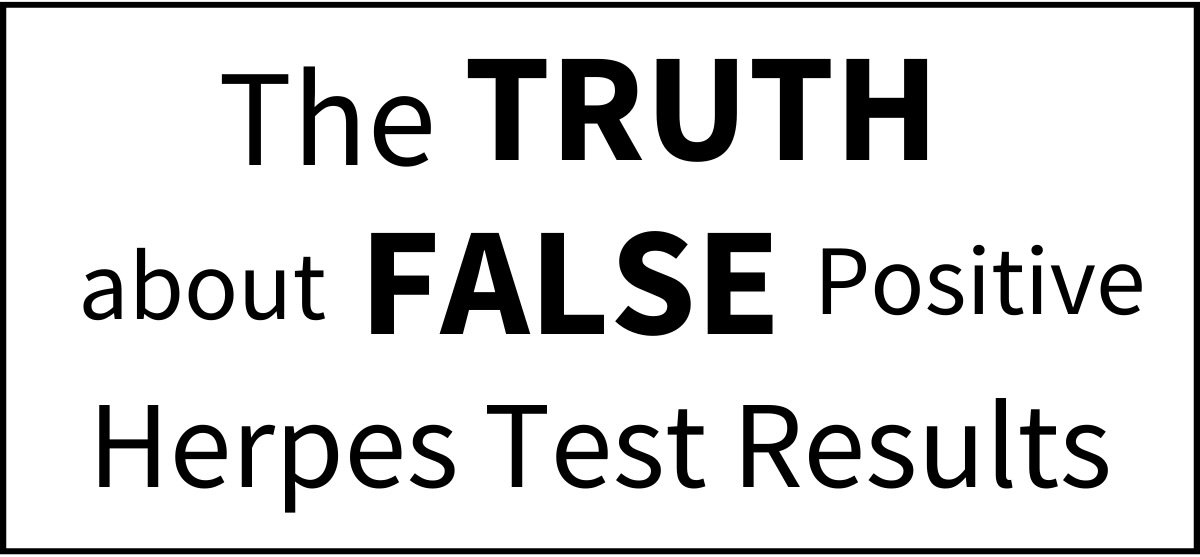The Truth about False Positive Herpes Test Results
Over the years, many people with no history of herpes symptoms have called me to begin counseling or group therapy after receiving a herpes diagnosis from a blood test screening alone. It is true that you can have herpes and not be aware of symptoms. However, if someone tells me they have never recognized any symptoms, I think it’s worth exploring a little further to make sure the diagnosis is accurate. I suggest that they obtain a copy of their results and look at whether they had an IgG or IgM based test (the CDC says IgM based tests should not be used to diagnose herpes). Once they confirm that it was an IgG based test, I ask them to look for the index value of their result. About 50% of people who test positive for HSV-2 on an IgG based test with an index value between 1.1 and 3.5 do not have herpes (the lower the value, the higher chance of a false positive, the higher the value the more likely it’s an accurate result). The CDC recommends that anyone who tests positive on an IgG based test with an index value that falls between a 1.1 and 3.0 should get confirmatory testing (experts say the Western Blot is the best confirmatory test). Research shows that there can even be false positives above this range in some people.
(**A positive swab test of a lesion in someone with symptoms can be a confirmation. Blood tests are helpful when a swab test can’t be obtained or to help sort out other matters.)
Getting Help with Confirmatory Testing
I've found that an important part of mental health for patients with herpes is to feel a sense of understanding and agency around their diagnosis and test results and to learn information that can help them make a decision about whether they want to pursue confirmatory testing or not. I often refer patients with low positive results to consult with a medical expert if they have additional questions. The healthcare provider I trust the most with these types of questions is Terri Warren, NP, who has been an excellent resource for many of my patients. There may be other healthcare providers who can navigate appropriate confirmatory testing, but many providers have not learned how to do this. If you are questioning your diagnosis and want to learn more about confirmatory testing, you can do so here. If you need help coping with the diagnosis or with awaiting results, therapy or a support group can often help.
Low Positive Result with Symptoms
On rare occasion, I have seen people with symptoms that are assumed to be herpes, even recurring symptoms, who have not obtained a positive culture and who have a negative or low positive result on the IgG, even after an adequate amount of time has passed to have a higher value. Other conditions can cause rashes on genitals, such as eczema and even Lyme disease (yes, I have actually seen this happen). While a case like this can certainly be a true positive for herpes, if something is just not adding up in your mind, it may make sense to explore it further with your healthcare provider or perhaps seek confirmatory testing (either via a swab or Western Blot for instance).
A Little Something About HSV-1
HSV-1 can also have low index values that are false positive. If there is no history of symptoms and it is a true positive, it is impossible to know if an HSV-1 infection is oral or genital (unless the individual has never had contact that could expose the genital area). More than 50% of adults in the U.S. will test positive for HSV-1.
Take that number in…
Most HSV-1 infections are oral and plenty of people don’t recall ever having a cold sore or symptoms that would explain their HSV-1 diagnosis. That said, there are also many people who contract it genitally, often from someone who has the infection orally and performs oral sex (with or without active symptoms).
Coping with Results
Finding out your result is not a false positive or simply having to wait for confirmation of a result can be really difficult. If your result is a true positive, please know that you are not alone! I know this is not something you probably ever thought you would have to deal with. It can take time to adjust, but you absolutely can still date, have sex, have relationships, and feel good about yourself again. You may not be able to imagine it right now, but it’s true.
I offer individual therapy for men and women and group therapy for women in NYC who are diagnosed with herpes. It can be a relief to have space to talk about how you are feeling and how you will move forward with someone like me who is knowledgeable about herpes and familiar with the questions and worries people newly diagnosed with herpes often have.
I have been working with men and women with herpes for over 20 years and have watched many, many people get through this and go on to enjoy dating, sex, and relationships again. If you would like the support of therapy, I would love to help!
More Posts About Herpes
I hope the resources in this blog can further assist you. Read other posts about herpes here.
In-Person Counseling in New York
If you are in New York and would like in-person counseling or to participate in my therapy group for women diagnosed with herpes, please reach out. I’m happy to speak with you about whether counseling or the group would be a good fit.
**This information is not intended to replace medical advice or psychotherapy and is not intended to address all the caveats of a diagnosis. I am not a medical provider and simply provide this information as a resource for learning.
Get Updates about New Blog Posts
If you find these posts helpful, sign-up to receive notices of new posts here. I will never sell your information. You can unsubscribe at any time. View my privacy policy here.
About Melissa King
I am a licensed mental health counselor in New York City with a psychotherapy office in the neighborhood of Murray Hill in Manhattan. Find out more about me here. I'd love to hear from you. Contact me if there's a topic you'd like to read about here.
**Information on this site is not intended to replace medical advice and does not constitute a psychotherapeutic relationship with the reader.

